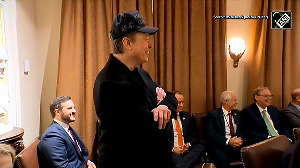The postponement of the SAARC summit, for which India is being blamed, was a no-brainer, given the intense animosity that prevails between two of the member states in the subcontinent. But what exactly has the South Asian Association for Regional Cooperation achieved since its formation in 1985?
'SAARC is an organisation with strong ambitions, but restricted powers. From the start the scope of SAARC was reduced by the rule of unanimity, by the slowness and consultative nature of the procedures, by the decision to exclude areas of disagreement, and finally by the absence from the beginning of a free trade treaty or a preferential agreement,' says the European Union 's web page on the subject of EU-SAARC ties.
'The animosity between the "estranged sisters" is a barrier to regional co-operation (the minor States refusing to be drawn into the quarrel), it has isolated the region from other dynamic regions (ASEAN or APEC, for example, do not wish to import into their structures the decision-blocking South Asian conflicts) and prevented it from setting up other promising group (the Indian Ocean Rim initiative),' it
concludes.
So why go through with the charade? Why not scrap an association that can be 'held hostage' by any member that feels like it?
What is the point of having an association that does not allow bilateral issues to be discussed multilaterally? This clause, which India set as a precondition to its membership, has ensured that the pledge to 'reinforce links between the countries of this area; and, lastly, to promote mutual collaboration and assistance in the economic, social, cultural technical and scientific fields' remains totally unattainable. How can one promote 'mutual collaboration and assistance' if two of the member states are members of a mutual hate club?
And how, given the tension between Delhi and Islamabad, will the South Asian Free Trade Area ever become viable or possible? Pakistan refuses to accept any such treaty since it would put India, the larger
state, in a favourable position. While other members of the association regularly complain of India's growing trade surplus with other SAARC countries. In other words, India exports a lot more than it imports from the region. And that isn't much to begin with.
Conversely, how can India refuse to participate on grounds of bilateral issues with another member state? The message going out to other members is that India is letting its problems with a neighbour scuttle a regional initiative.
The point is, as long as India and Pakistan remain at loggerheads, SAARC is dead in the water. And all those hoping that relations between the two will improve soon are advised not to hold their breath.
Of course, there are some who argue that Prime Minister Atal Bihari Vajpayee should have attended, and teamed up with the other members to gang up against Pakistan. This, they say, would also send out the right signals to the West, that India, despite all the lies and terror emanating from Islamabad, is still willing to talk with it on some platforms.
But one, it would be naïve to assume that the other members are interested in taking sides in this dispute. They are far more keen on forging alliances that will help them grow and cooperate.
And two, why, after categorically rejecting all avenues for talks until terrorism is stopped, would India suddenly want to send out a contradictory signal anyway?
Even if it wants to talk to Islamabad, the hard line taken by Vajpayee and Company cannot be suddenly redrawn without major political fallouts. What is the point of an association in which the actions of India, he largest and most powerful member, will always be viewed with suspicion by the smaller states?
SAARC has perhaps actually fuelled, rather than dampened the anti-India sentiments in the region, and this latest postponement is likely to add to them.
As it is, other member states resent the media attention that is devoted solely to the two nuclear states at each summit. Instead of focusing on the summit, the world media went to town with Pervez Musharraf's impromptu handshake with a flustered Vajpayee at the last summit in Kathmandu.
Besides, India's relationship with its neighbouring states keeps fluctuating with regime changes.
The charges about harbouring Al Qaeda and ISI activists by Bangladesh, even if true, hasn't quite endeared India to Dhaka, which now prefers wooing Islamabad.
Nepalis still remember how then prime minister Rajiv Gandhi brought the landlocked nation to its knees with the economic blockade in 1989. Bhutan knows and resents the fact that India can do the same to it.
Sri Lanka too has reservations about the Tamil card in India, and though ties have been good of late, India will have to do some tightrope walking once the Liberation Tigers of Tamil Eelam, accused of assassinating Rajiv Gandhi, is recognised as a political entity in the island nation.
As for the Maldives, while ties are normal, the alacrity with which India sent its paratroopers (albeit at the behest of the Maldives government) to crush a coup attempt by mercenaries in 1988, did rattle others in the region and sparked off a debate on New Delhi's desire to be the region's police.
So instead of playing a silly game of one-upmanship, with the Indian foreign office sending out conflicting signals about Vajpayee's attendance till the last minute, New Delhi should now attempt to withdraw honourably from the association.
Failing which, it must allow dramatic changes in the charter that will allow member states to meet even if two or more members refuse to attend. This would give other members wanting to collaborate with each other a forum without the baggage of the India-Pakistan spat perpetually looming over each and every summit.
And despite fears of being politically overshadowed and cheap Chinese products flooding the Indian market, New Delhi should strongly consider forging a fresh regional association which includes its giant neighbour China.
If India wants to be considered a player on the world stage, it must stop acting boorishly on the regional stage, and move on to bigger, and hopefully better, associations.
This is the first column by Senior Editor Ramananda Sengupta on international affairs.






 © 2025
© 2025